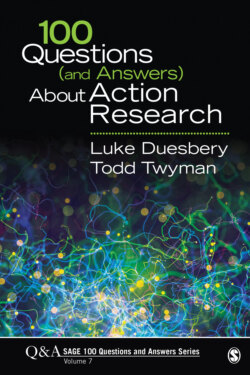Читать книгу 100 Questions (and Answers) About Action Research - Luke Duesbery - Страница 22
На сайте Литреса книга снята с продажи.
Question 12 What’s the Difference Between Theory and Conceptual Frameworks in Action Research?
ОглавлениеTheory and conceptual frameworks sound similar, and indeed they are. However, they mean different things in different contexts, which is particularly important to science. In metaphysical terms, a concept is something that fundamentally exists, like the concept of gravity. It is an abstract idea thought to explain why things fall to the ground, or to explain why we don’t float away. On the other hand, a theory is something that is tested to explain a certain phenomenon, like why someone behaves in a certain way. Think intrinsic and extrinsic motivation as theories to explain why someone works hard, or not. Theories are typically used to challenge and extend existing assumptions about certain observed phenomena.
To confuse matters, gravity could be considered a theory, but here’s the difference. As a concept, gravity is some force that just is. As a theory, gravity can be tested to prove or disprove its legitimacy with a bunch of observations in an effort to prove its existence. Here are a few ways to figure out if you are working with a concept or theory:
A concept is something abstract, and a theory is a collection of evidence.
A concept gives a name or label to the idea behind something that does not require testing, like the concept of faith underpinning rituals and ceremonies of a given religion or the reasoning behind a new car design that would benefit customers.
Theory would be something like there is compelling evidence that the Earth actually orbits the Sun, not vice versa.
A concept is a general idea that evolves, and a theory is named as the best explanation for an observed phenomenon.
We can have different views of a given concept, but for a theory to hold, we must try to explain it through empirical evidence.
More questions? See questions 19 and 20.
